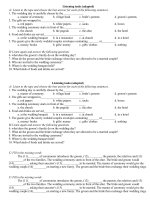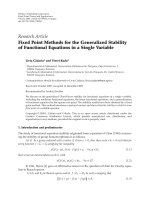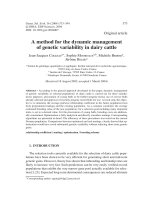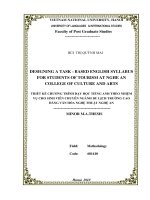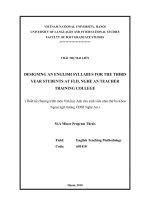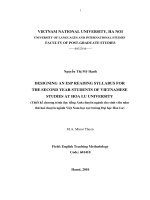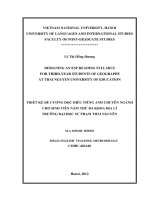Designing text-based tasks for the third-year students of Navigation faculty in Vietnam Maritime University = Thiết kế các nhiệm vụ học tập dựa trên bài khóa ch
Bạn đang xem bản rút gọn của tài liệu. Xem và tải ngay bản đầy đủ của tài liệu tại đây (462.94 KB, 7 trang )
VIETNAM NATIONAL UNIVERSITY, HANOI
UNIVERSITY OF LANGUAGES AND INTERNATIONAL STUDIES
FACULTY OF POSTGRADUATE STUDIES
NGUYỄN THỊ PHƯỢNG
DESIGNING TEXT-BASED TASKS FOR THE THIRD-YEAR
STUDENTS OF NAVIGATION FACULTY
IN VIETNAM MARITIME UNIVERSITY
(Thiết kế các nhiệm vụ học tập dựa trên bài khóa cho sinh viên năm thứ ba
khoa Điều khiển tàu biển – Trường Đại học Hàng hải Việt Nam)
M.A MINOR PROGRAMME THESIS
Field: English Teaching Methodology
Code: 60.14.10
HANOI – 2010
VIETNAM NATIONAL UNIVERSITY, HANOI
UNIVERSITY OF LANGUAGES AND INTERNATIONAL STUDIES
FACULTY OF POSTGRADUATE STUDIES
NGUYỄN THỊ PHƯỢNG
DESIGNING TEXT-BASED TASKS FOR THE THIRD-YEAR
STUDENTS OF NAVIGATION FACULTY
IN VIETNAM MARITIME UNIVERSITY
(Thiết kế các nhiệm vụ học tập dựa trên bài khóa cho sinh viên năm thứ ba
khoa Điều khiển tàu biển – Trường Đại học Hàng hải Việt Nam)
M.A MINOR PROGRAMME THESIS
Field: English Teaching Methodology
Code: 60.14.10
Supervisor: Đinh Hải Yến, M.Ed
HANOI - 2010
4
TABLE OF CONTENTS
CONTENTS PAGE
Declaration i
Acknowledgement ii
Abstract iii
List of tables and figures viii
List of abbreviations ix
PART A: INTRODUCTION
1. Rationale of the study 1
2. Aims and objectives of the study 3
3. Scope of the study 3
4. Methods of the study 4
5. Significance of the study 4
6. Overview of the study 5
PART B: DEVELOPMENT
CHAPTER 1: LITERATURE REVIEW
1. Defining tasks 6
2. Types of tasks 8
3. Task-based framework 10
4. Text-based tasks 12
4.1. Defining texts in language teaching 12
4.2. Tasks based on texts 12
4.3. Designing text-based task 13
5
5. Considerations in task design 13
6. Using texts in the teaching of English for Specific Purpose 15
7. Summary 16
CHAPTER 2: METHODOLOGY
1. Background of the study 17
1.1. Current learning and teaching of English in general and ESP
in particular at Vietnam Maritime University 17
1.2. Identification of the problem 17
2. Research questions 19
3. Participants 19
4. Implementation of the action research 20
5. Data collection procedures 21
5.1. Description of the pre-treatment questionnaire 21
5.2. Description of the pre-treatment interview 22
5.3. Description of the students’ diary 22
5.4. Description of the post – treatment questionnaire 23
5.5. Description of the post – treatment interview 24
6. Data analysis procedures 24
7. Summary 24
CHAPTER 3: RESULTS AND DISCUSSION
1. Phase One: Conducting pre-treatment questionnaire survey and interview 25
1.1. The results of the pre-treatment questionnaire survey 25
1.1.1. Students’ needs 25
6
1.1.2. The ESP course 26
1.2. The results of the pre-treatment interview 30
2. Phase Two: Conducting the trial lessons 32
2.1. The implementation of the trial lessons 32
2.2. The results of the students’ diary 32
3. Phase Three: Conducting post-treatment questionnaire survey and interview 33
3.1. The results of the post-treatment questionnaire survey 33
3.1.1. Students’ motivations 33
3.1.2. Language skill development 33
3.1.3. The trial lessons’ sequence 34
3.2. The results of the post-treatment interview 37
4. Summary 38
PART 3: CONCLUSION
1. Summary and conclusions 39
2. Pedagogical implications 40
3. Limitations of the study and suggestions for further study 41
REFERENCES 43
APPENDICES
Appendix 1: A sample unit in the course book “Business English for Seamen” I
Appendix 2: A sample lesson plan IV
Appendix 3: Two samples of students’ diaries XIII
Appendix 4: Pre-treatment questionnaire survey (English version) XV
3
Abstract
For some recent decades, task-based language learning and teaching (TBLT) has,
been familiar with scholars, researchers, teachers and students all over the world; however,
its applicability seems to be more on the teaching of general English than English for
Specific Purpose (ESP). The purpose of this study was to examine the needs and
assessments of students from Navigation Faculty in Vietnam Maritime University when
learning ESP, and suggest effective ways to design tasks based on available texts in the
course book. Both quantitative and qualitative research methodologies were utilized in this
action research study. The quantitative research data were gathered with the aids of two
questionnaire surveys, with the first being administered before the trial lessons (102
respondents out of 105 questionnaires sent out) and the second one after the trial lessons
(103 respondents out of 105 questionnaires sent out). The qualitative research data were
collected from two in-depth interviews with the students for the insightful information
about students’ judgments towards the teaching and learning of ESP before and after the
trial lessons. The results of the first questionnaire survey revealed a high level of
dissatisfaction within the students towards the current ESP course in terms of need
fulfillments, language skill development and classroom activities. This was reassured by
the results of the first interview with students, the result of which proved that students were
unhappy with the course due to the lack of communicative activities such as discussion and
listening. The second survey, which was conducted after the trial lessons, however saw a
positive change in the students’ motivations and attitudes on the ESP course. They felt that
they were learning for pleasure and they liked the ways they learned ESP from the tasks
designed on the given texts. The results from the after-treatment interview also confirmed
that students would like to have more lessons as such in the future. Hopefully, this research
can create a beginning for the new way of approaching texts in ESP.
PDF Merger
Thank you for evaluating AnyBizSoft PDF
Merger! To remove this page, please
register your program!
Go to Purchase Now>>
Merge multiple PDF files into one
Select page range of PDF to merge
Select specific page(s) to merge
Extract page(s) from different PDF
files and merge into one
AnyBizSoft

